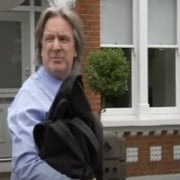Doorstepping and How Not To Do It
Dealing with ‘doorstepping’ is difficult.
But giving a flippant answer to a serious question is not the way to do it.
Let’s not deny it, dealing with ‘doorstep’ questions from journalists is difficult.
This is the name given to the journalistic practice of ‘ambushing’ your interviewee, usually when they are leaving their home (hence ‘doorstepping’), to see if they can provide answers to quick-fire questions, often shouted from the street.
But a clear example of how not to handle such an approach came this week – surprisingly – from a man who should be one of the smoothest media operators of all.
He’s Martin Frizell, the editor of This Morning – the programme at the centre of the current media interest in the behaviour and subsequent resignation of Phillip Schofield from ITV in particular and, it would appear, from television in general.
“I’ll tell you what’s toxic; I’ve always found toxic: aubergine. Do you like aubergine? Do you?”
Despite the journalist (quite sensibly) ignoring his question and repeating their original enquiry, Frizell continued:
“Do you like aubergine? Because I don’t like aubergine. It’s just a personal thing.”
Then he walked out of camera shot.
What are we to make of this reply?
It would be easy to dismiss such flippancy as simply a light-hearted way of dodging the question. But then we remember the two men at the centre of the crisis: one who wants his identity to remain a secret and is being provided with legal help, and the other a fallen celebrity who’s lost a sparkling career and is now said to be on suicide watch. Hardly the subject matter for flippancy, you would think.
Indeed, an SNP MP has already criticised Frizell’s approach, saying on Twitter “This is a deeply inappropriate and disrespectful way to respond to questions about safeguarding vulnerable staff and bullying in the workplace at ITV.”
So, what’s going on?
Frizell’s answer was significant for seven key reasons.
- It’s downright bizarre. The comment either simply doesn’t mean anything or is so impenetrable that we’re left none the wiser. I’m reminded of footballer Eric Cantona’s famous line about “when the seagulls follow the trawler” at a press conference in 1995. No clarity; just more questions than answers. It’s not clever, it’s just weird.
- Was he attempting to equate a personal dislike for a certain food with toxicity? Could he be suggesting that some people might find the workplace toxic, whilst others don’t? But as one is a subjective taste and the other is an objective poison, the comparison fails.
- He should know better. Frizell’s career has been steeped in the media. He was a correspondent for Thomson Reuters and GMTV, where he became editor. He’s had roles in PR and Australian television, before becoming an editor for Loose Women, which led to his role on This Morning. He is a shrewd and wily media operator, fully aware of what speaking to the press involves and the impact that quotes can have. As a journalist, it’s likely he would have doorstepped interviewees himself. But now, as an interviewee, he’s falling into the very same trap he would have despised or ridiculed in his former career.
- He repeats the negative word “toxic” from the question in his answer – not just once, but twice. Come on, this is Media Training 101: don’t amplify the negative by using the same ‘unhelpful’ word in your response, even if you are doing so to deny the suggestion.
- This was an unforced error. Nobody brow-beat him into saying what he said. His answer sounds like something he had planned; he’d actively thought it through previously, even if he hadn’t anticipated the specific question (which seems unlikely since it has been central to the controversy, particularly considering his role in management).
- As an editor of This Morning, this sort of response would have provided content for a programme feature. You can imagine a replay of the footage and a segment involving two guests brought in to discuss the topic of workplace bullying, with calls invited and a caption on screen reading: “Does your boss treat your concerns seriously?” He seems to have gone out of his way to provide exactly the sort of unwarranted reply on which his own show would thrive.
- Finally, it runs counter to the professed aims of the programme, as voiced by presenter Holly Willoughby on her return from holiday this week, that “what unites us all now, is a desire to heal for the health and well-being of everyone” in order to “start this new chapter and get back to a place of warmth and magic that this show holds for all of us.” What, with a flippant line about aubergines? Really?
Whatever your views of the controversy, wherever you place the blame, it’s important to note that no crime has been committed. As a result, Piers Morgan has said it’s time to stop the “relentless persecution” of Phillip Schofield. Jeremy Clarkson has agreed, saying that he has “never seen a witch hunt like it”.
But what’s so odd is that a seasoned media professional, operating at the very heart of the story, could have chosen to calm troubled waters when doorstepped by a journalist.
Instead, he chose to stir them further.
If you’d like to learn how to deal with doorstep questions from journalists – and a whole host of other media training tips and tricks – you know where we are…
- Introducing the ‘Act Out’: - October 29, 2024
- Politics as Entertainment - July 2, 2024
- All Presenters Need a Critical Friend - April 23, 2024




Leave a Reply
Want to join the discussion?Feel free to contribute!